小升初复习专题 动词复习(含答案)
图片预览
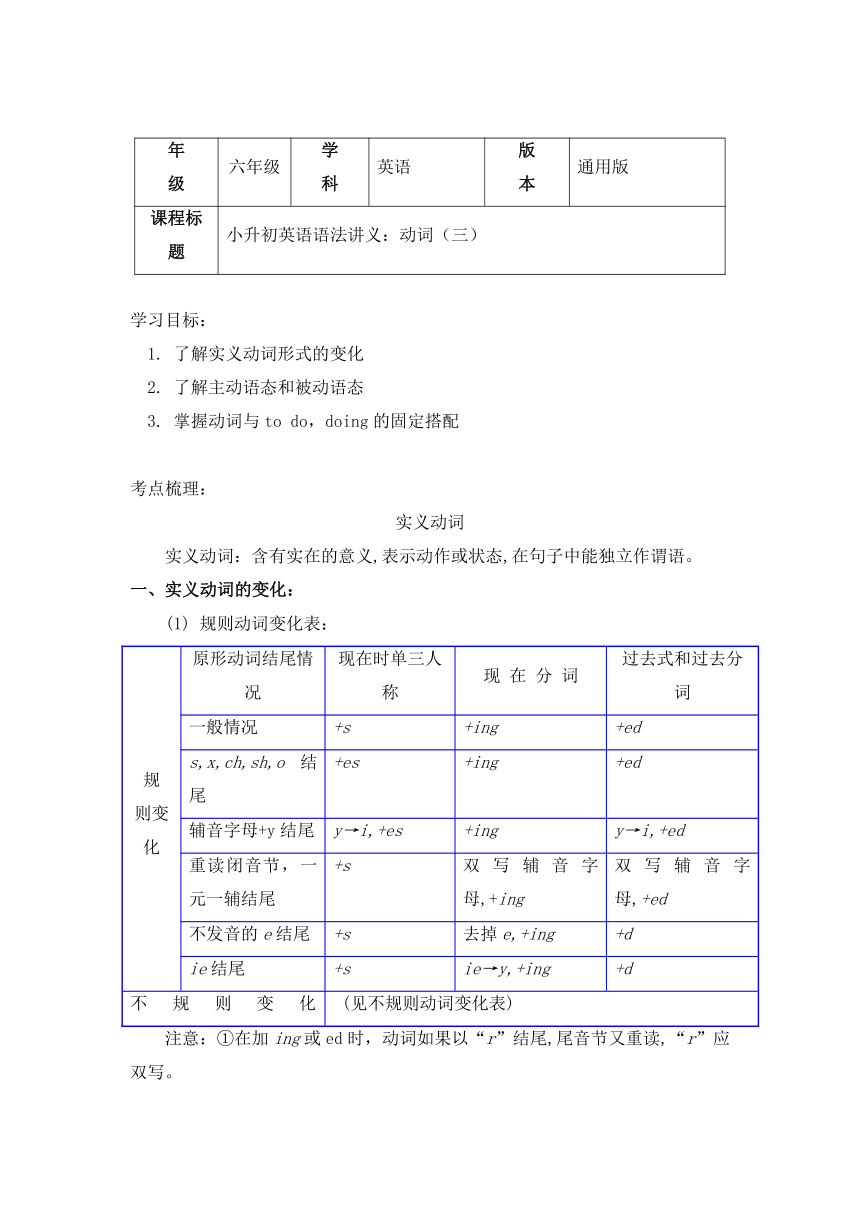
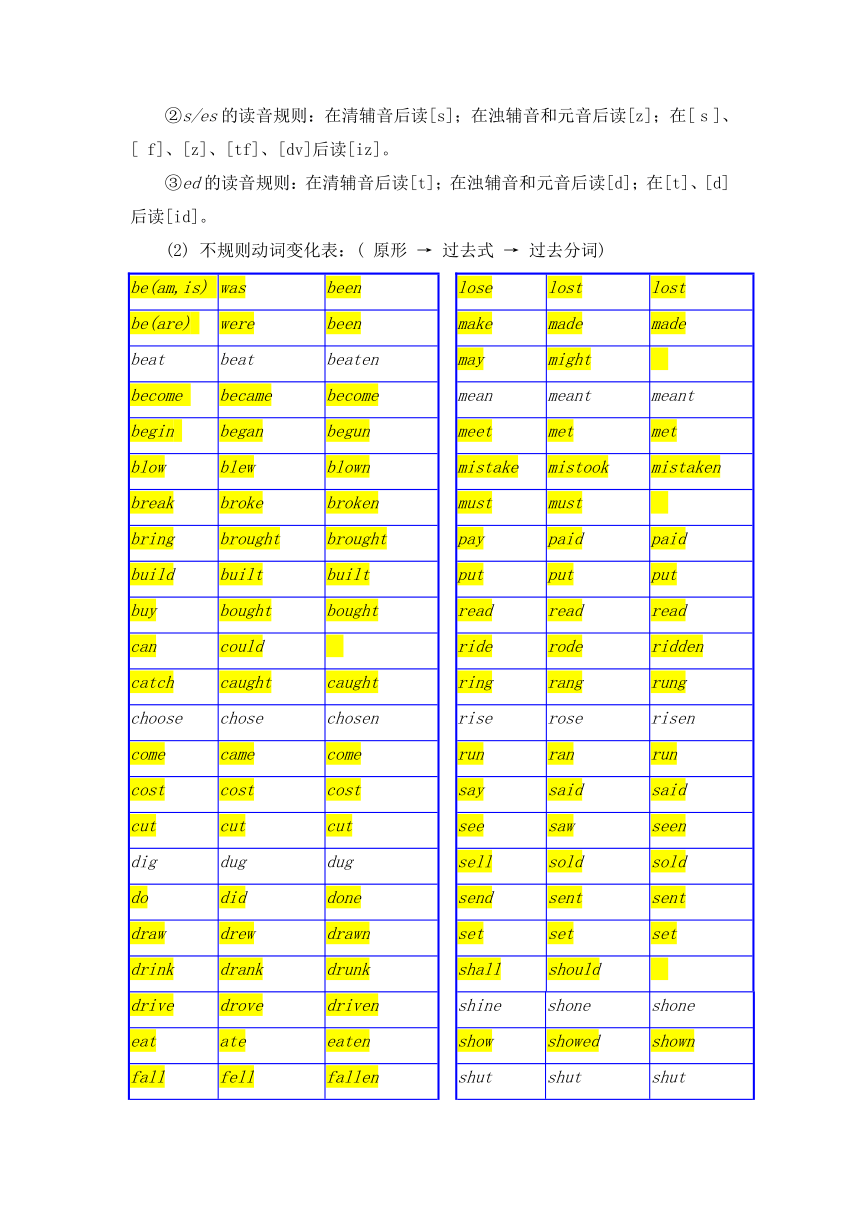
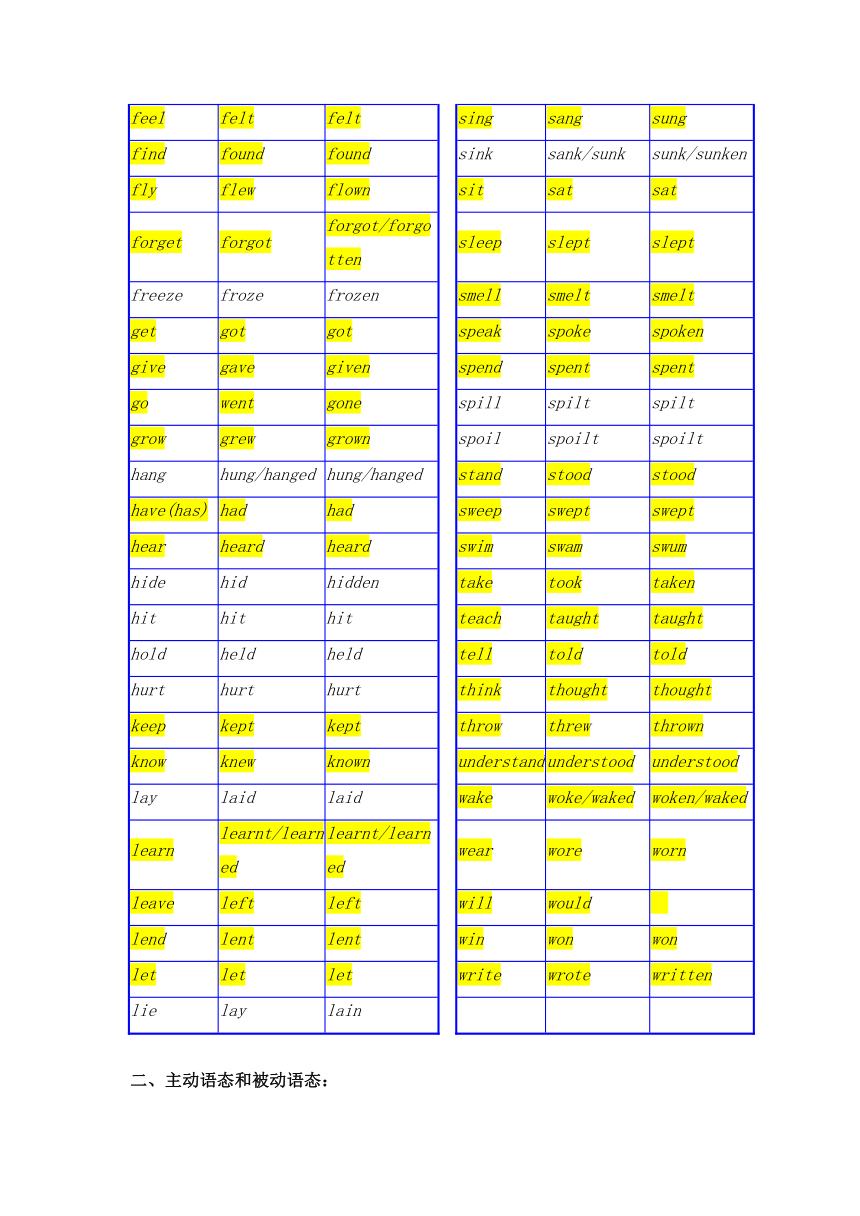
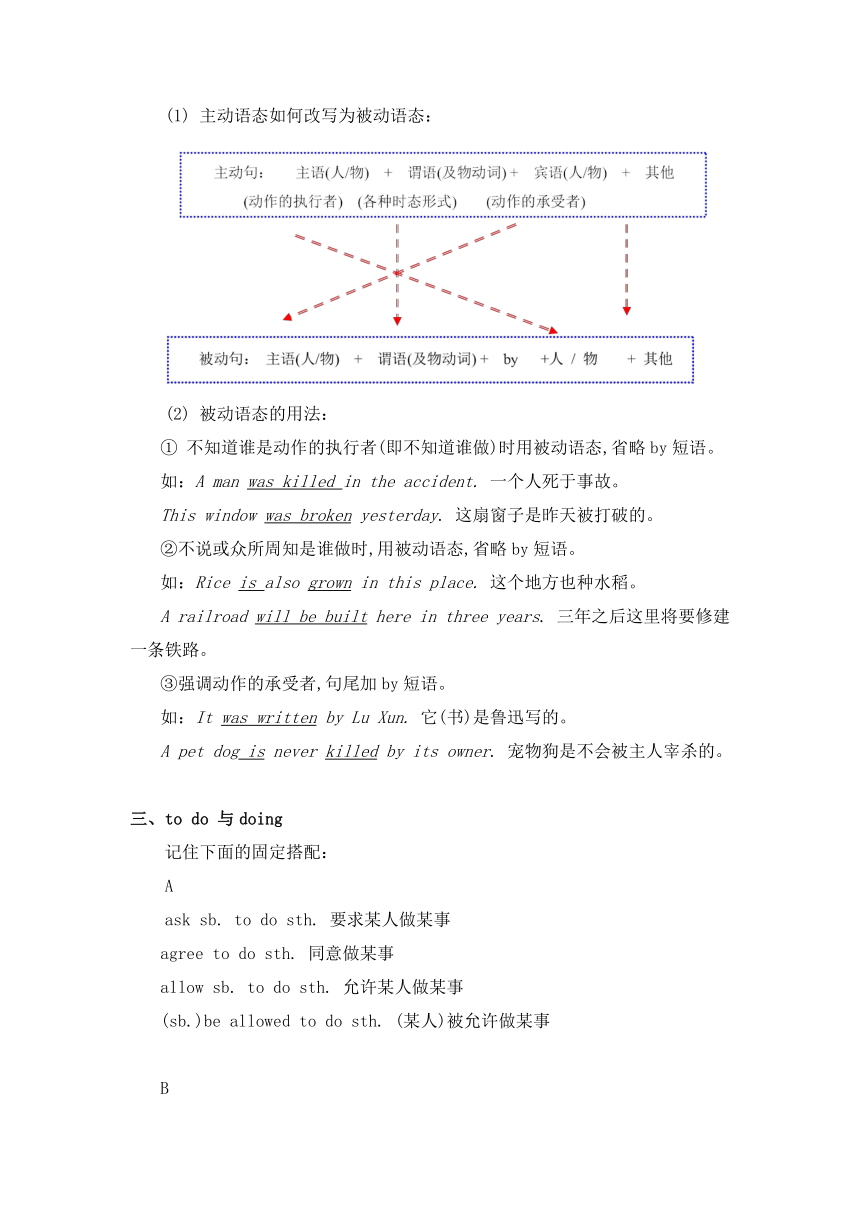
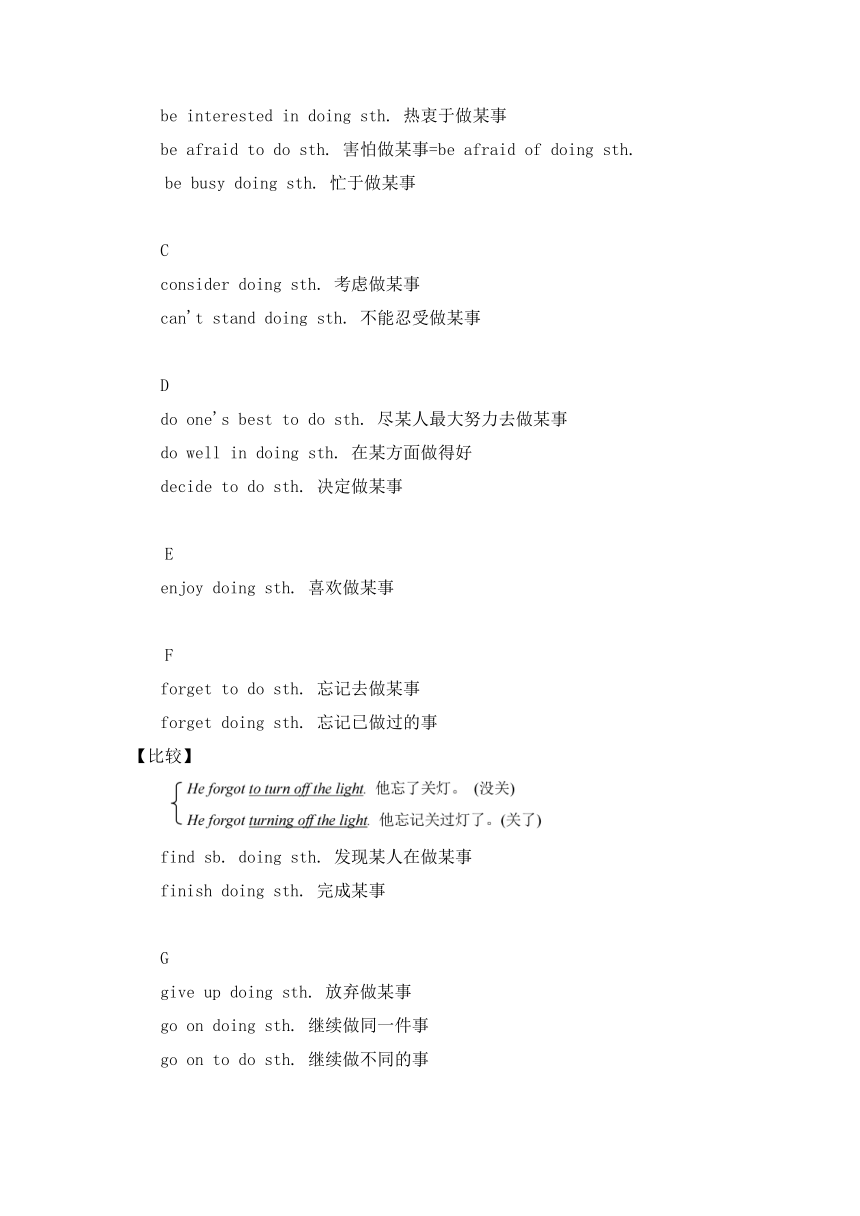
文档简介
年 级 六年级 学 科 英语 版 本 通用版
课程标题 小升初英语语法讲义:动词(三)
学习目标:
1. 了解实义动词形式的变化
2. 了解主动语态和被动语态
3. 掌握动词与to do,doing的固定搭配
考点梳理:
实义动词
实义动词:含有实在的意义,表示动作或状态,在句子中能独立作谓语。
一、实义动词的变化:
(1) 规则动词变化表:
规 则变 化 原形动词结尾情况 现在时单三人称 现 在 分 词 过去式和过去分词
一般情况 +s +ing +ed
s,x,ch,sh,o结尾 +es +ing +ed
辅音字母+y结尾 y→i,+es +ing y→i,+ed
重读闭音节,一元一辅结尾 +s 双写辅音字母,+ing 双写辅音字母,+ed
不发音的e结尾 +s 去掉e,+ing +d
ie结尾 +s ie→y,+ing +d
不规则变化 (见不规则动词变化表)
注意:①在加ing或ed时,动词如果以“r”结尾,尾音节又重读,“r”应双写。
②s/es的读音规则:在清辅音后读[s];在浊辅音和元音后读[z];在[ s ]、[ f]、[z]、[tf]、[dv]后读[iz]。
③ed的读音规则:在清辅音后读[t];在浊辅音和元音后读[d];在[t]、[d]后读[id]。
(2) 不规则动词变化表:( 原形 → 过去式 → 过去分词)
be(am,is) was been
lose lost lost
be(are) were been
make made made
beat beat beaten
may might
become became become
mean meant meant
begin began begun
meet met met
blow blew blown
mistake mistook mistaken
break broke broken
must must
bring brought brought
pay paid paid
build built built
put put put
buy bought bought
read read read
can could
ride rode ridden
catch caught caught
ring rang rung
choose chose chosen
rise rose risen
come came come
run ran run
cost cost cost
say said said
cut cut cut
see saw seen
dig dug dug
sell sold sold
do did done
send sent sent
draw drew drawn
set set set
drink drank drunk
shall should
drive drove driven
shine shone shone
eat ate eaten
show showed shown
fall fell fallen
shut shut shut
feel felt felt
sing sang sung
find found found
sink sank/sunk sunk/sunken
fly flew flown
sit sat sat
forget forgot forgot/forgotten
sleep slept slept
freeze froze frozen
smell smelt smelt
get got got
speak spoke spoken
give gave given
spend spent spent
go went gone
spill spilt spilt
grow grew grown
spoil spoilt spoilt
hang hung/hanged hung/hanged
stand stood stood
have(has) had had
sweep swept swept
hear heard heard
swim swam swum
hide hid hidden
take took taken
hit hit hit
teach taught taught
hold held held
tell told told
hurt hurt hurt
think thought thought
keep kept kept
throw threw thrown
know knew known
understand understood understood
lay laid laid
wake woke/waked woken/waked
learn learnt/learned learnt/learned
wear wore worn
leave left left
will would
lend lent lent
win won won
let let let
write wrote written
lie lay lain
二、主动语态和被动语态:
(1) 主动语态如何改写为被动语态:
(2) 被动语态的用法:
① 不知道谁是动作的执行者(即不知道谁做)时用被动语态,省略by短语。
如:A man was killed in the accident. 一个人死于事故。
This window was broken yesterday. 这扇窗子是昨天被打破的。
②不说或众所周知是谁做时,用被动语态,省略by短语。
如:Rice is also grown in this place. 这个地方也种水稻。
A railroad will be built here in three years. 三年之后这里将要修建一条铁路。
③强调动作的承受者,句尾加by短语。
如:It was written by Lu Xun. 它(书)是鲁迅写的。
A pet dog is never killed by its owner. 宠物狗是不会被主人宰杀的。
三、to do 与doing
记住下面的固定搭配:
A
ask sb. to do sth. 要求某人做某事
agree to do sth. 同意做某事
allow sb. to do sth. 允许某人做某事
(sb.)be allowed to do sth. (某人)被允许做某事
B
be interested in doing sth. 热衷于做某事
be afraid to do sth. 害怕做某事=be afraid of doing sth.
be busy doing sth. 忙于做某事
C
consider doing sth. 考虑做某事
can't stand doing sth. 不能忍受做某事
D
do one's best to do sth. 尽某人最大努力去做某事
do well in doing sth. 在某方面做得好
decide to do sth. 决定做某事
E
enjoy doing sth. 喜欢做某事
F
forget to do sth. 忘记去做某事
forget doing sth. 忘记已做过的事
【比较】
find sb. doing sth. 发现某人在做某事
finish doing sth. 完成某事
G
give up doing sth. 放弃做某事
go on doing sth. 继续做同一件事
go on to do sth. 继续做不同的事
H
have trouble (in)doing sth. 做某事有困难
how to do sth. 怎么去做某事
had better do sth. 最好做某事
hope to do sth. 希望做某事
help sb. to do sth.=help sb. with sth 帮助某人做某事
I
It is good/bad to do sth. 做某事是好(坏)的
It is time for doing sth. 是该做某事的时间了
It is time to do sth. 是该做某事的时间了
invite sb. to do sth. 邀请某人去做某事
K
keep (on) doing sth. 继续做某事
keep sb. doing sth. 让某人一直做某事
keep sb. from doing sth. 不让某人做某事
L
let sb. do sth. 让某人去做某事
love to do sth. 暂时性地喜欢去做某事,用法同like
love doing sth. 指一直都很喜欢做某事,用法同like
like to do sth. 暂时性地喜欢去做某事,用法同love
like doing sth. 指一直都很喜欢做某事,用法同love
listen to sth. 听……
it takes sb.some time to do sth. 花时间做某事
M
make sb. do sth. 使某人做某事
mind doing sth. 介意做某事
N
need to do sth. 需要去做某事
P
practice doing sth. 练习做某事
prefer doing A to doing B 比起做B这件事更喜欢做A 这件事
plan to do sth. 计划做某事
plan for sth. 计划某事
R
remember (not)to do sth. (不)记得去做……
remember doing sth. 记得已做过……
S
stop to do sth. 停止原先做的事后再去做某事
stop doing sth. 停止正在做的事
succeed in doing sth. 在某事上获取了成功
see sb. doing sth. 看见某人正在做某事
(sb.)spend some time doing sth. (某人)花时间做某事
start to do sth./doing sth. =begin to do sth./doing sth.开始做某事
T
try to do sth. 努力做某事
try doing sth. 试着做某事
tell sb. (not)to do sth. 告诉某人做(不做)某事
thank sb. for doing sth. 感谢某人做了某事
too...to do sth. 太……而不能做某事
the best way to do sth. 做某事的最好方式
send sb. to do sth. 派某人去做某事
U
used to do sth. 过去经常做某事
use for doing sth. 用于做某事
W
would like to do sth. 想要(愿意)去做某事(程度更深)
want to do sth. 想要去做某事
want sb. to do sth. 想要某人做某事
What about doing sth.? 做某事怎么样? (通常用于提建议)
Why not do sth.? 为什么不做某事呢? (通常用于提建议)
wait for sb. to do sth. 等待某人做某事
Y
you'd better (not)do sth. 你最好(不)做某事
【考题链接】
1. Lily enjoys __________to music very much.
A. to listen B. listen C. listening D. listened
2. Tell the boys ___________ noise because the guests are sleeping inside.
A. to stop to make B. not make C. don’t make D. to stop making
3. They are planning _____________ their class meeting.
A. with B. to C. for D. of
4. What about something ________?
A. eat B. drink C. to eat D. get
5. You’d better _________ to the museum with her.
A. go B. going C. to go D. went
6. Let’s ________ soccer after class.
A. play B. playing C. to play D. plays
7. I like apples very much and I’d like _________ some now.
A. eat B. eating C. to eat D. eats
8. Thank you for __________ me so many presents.
A. buy B. buying C. to buy D. bought
9. Excuse me, can you tell me _________ photos?
A. to take B. how to take C. what to take D. how can I take
10. Tim wants _________ a rest now.
A. have B. has C. having D. to have
答案:1. C 2. D 3. C 4. C 5. A 6. A 7. C 8. B 9. B 10.D
应考必练:
一、写出下列动词的现在分词:
play________ run__________ swim _________ make__________
go_________ like________ write________ ski___________
read________ have_________ sing ________ dance_________
put________ see________ buy _________ love____________
live_______ take_________ come ________ get_________
stop_________ sit ________ begin________ shop___________
答案:playing, running, swimming, making, going, liking, writing, skiing, reading, having, singing, dancing, putting, seeing, buying, loving, living, taking, coming, getting, stopping, sitting, beginning, shopping
二、写出下列动词的第三人称单数
drink ________ go _______ stay ________ make ________
look _________ have_______ pass_______ carry ____
come________ watch______ plant_______ fly ________
study_______ brush______ do_________ teach_______
wash_______
答案:drinks, goes, stays, makes, looks, has, passes, carries, comes, watches, plants, flies, studies, brushes, does, teaches, washes
三、写出下列动词的过去式
is fly_______ are________ drink________ play_______ go________
make_____ does________ lose________ win________ ask _____ teach______
eat_______ hurt_______ put ______ throw________ catch______ fall_______
do ________ buy________ see_______ come________ take________ miss______
like________ get_____ forget______ think________ say______ find_______
draw______ can________ break _______ give________
答案:was, flew, were, drank, played, went, made, did, lost, won, asked, taught, ate, hurt, put, threw, caught, fell, did, bought, saw, came, took, missed, liked, got, forgot, thought, said, found, drew, could, broke, gave
四、翻译句子:
I would like at the moment. 我现在想休息一下。
He liked in the pool near his house. 他喜爱在家附近的水塘里面游泳。
When did you learn ? 你什么时候开始学讲英语的?
Don’t forget when you leave. 你离开时别忘了关门。
Mum asked me . 妈妈叫我帮助她做饭。
I would like you . 我想要你见见我的父母。
The boss often made the workers . 老板常让工人们一天工作14小时。
Now let me . 现在让我和你一起下棋吧。
答案:
I would like to have a rest at the moment.
He liked to have a swim in the pool near his house.
When did you learn to speak English?
Don’t forget to close the door when you leave.
Mum asked me to help her with the cooking.
I would like you to see my parents.
The boss often made the workers work 14 hours a day.
Now let me play chess with you.
课程标题 小升初英语语法讲义:动词(三)
学习目标:
1. 了解实义动词形式的变化
2. 了解主动语态和被动语态
3. 掌握动词与to do,doing的固定搭配
考点梳理:
实义动词
实义动词:含有实在的意义,表示动作或状态,在句子中能独立作谓语。
一、实义动词的变化:
(1) 规则动词变化表:
规 则变 化 原形动词结尾情况 现在时单三人称 现 在 分 词 过去式和过去分词
一般情况 +s +ing +ed
s,x,ch,sh,o结尾 +es +ing +ed
辅音字母+y结尾 y→i,+es +ing y→i,+ed
重读闭音节,一元一辅结尾 +s 双写辅音字母,+ing 双写辅音字母,+ed
不发音的e结尾 +s 去掉e,+ing +d
ie结尾 +s ie→y,+ing +d
不规则变化 (见不规则动词变化表)
注意:①在加ing或ed时,动词如果以“r”结尾,尾音节又重读,“r”应双写。
②s/es的读音规则:在清辅音后读[s];在浊辅音和元音后读[z];在[ s ]、[ f]、[z]、[tf]、[dv]后读[iz]。
③ed的读音规则:在清辅音后读[t];在浊辅音和元音后读[d];在[t]、[d]后读[id]。
(2) 不规则动词变化表:( 原形 → 过去式 → 过去分词)
be(am,is) was been
lose lost lost
be(are) were been
make made made
beat beat beaten
may might
become became become
mean meant meant
begin began begun
meet met met
blow blew blown
mistake mistook mistaken
break broke broken
must must
bring brought brought
pay paid paid
build built built
put put put
buy bought bought
read read read
can could
ride rode ridden
catch caught caught
ring rang rung
choose chose chosen
rise rose risen
come came come
run ran run
cost cost cost
say said said
cut cut cut
see saw seen
dig dug dug
sell sold sold
do did done
send sent sent
draw drew drawn
set set set
drink drank drunk
shall should
drive drove driven
shine shone shone
eat ate eaten
show showed shown
fall fell fallen
shut shut shut
feel felt felt
sing sang sung
find found found
sink sank/sunk sunk/sunken
fly flew flown
sit sat sat
forget forgot forgot/forgotten
sleep slept slept
freeze froze frozen
smell smelt smelt
get got got
speak spoke spoken
give gave given
spend spent spent
go went gone
spill spilt spilt
grow grew grown
spoil spoilt spoilt
hang hung/hanged hung/hanged
stand stood stood
have(has) had had
sweep swept swept
hear heard heard
swim swam swum
hide hid hidden
take took taken
hit hit hit
teach taught taught
hold held held
tell told told
hurt hurt hurt
think thought thought
keep kept kept
throw threw thrown
know knew known
understand understood understood
lay laid laid
wake woke/waked woken/waked
learn learnt/learned learnt/learned
wear wore worn
leave left left
will would
lend lent lent
win won won
let let let
write wrote written
lie lay lain
二、主动语态和被动语态:
(1) 主动语态如何改写为被动语态:
(2) 被动语态的用法:
① 不知道谁是动作的执行者(即不知道谁做)时用被动语态,省略by短语。
如:A man was killed in the accident. 一个人死于事故。
This window was broken yesterday. 这扇窗子是昨天被打破的。
②不说或众所周知是谁做时,用被动语态,省略by短语。
如:Rice is also grown in this place. 这个地方也种水稻。
A railroad will be built here in three years. 三年之后这里将要修建一条铁路。
③强调动作的承受者,句尾加by短语。
如:It was written by Lu Xun. 它(书)是鲁迅写的。
A pet dog is never killed by its owner. 宠物狗是不会被主人宰杀的。
三、to do 与doing
记住下面的固定搭配:
A
ask sb. to do sth. 要求某人做某事
agree to do sth. 同意做某事
allow sb. to do sth. 允许某人做某事
(sb.)be allowed to do sth. (某人)被允许做某事
B
be interested in doing sth. 热衷于做某事
be afraid to do sth. 害怕做某事=be afraid of doing sth.
be busy doing sth. 忙于做某事
C
consider doing sth. 考虑做某事
can't stand doing sth. 不能忍受做某事
D
do one's best to do sth. 尽某人最大努力去做某事
do well in doing sth. 在某方面做得好
decide to do sth. 决定做某事
E
enjoy doing sth. 喜欢做某事
F
forget to do sth. 忘记去做某事
forget doing sth. 忘记已做过的事
【比较】
find sb. doing sth. 发现某人在做某事
finish doing sth. 完成某事
G
give up doing sth. 放弃做某事
go on doing sth. 继续做同一件事
go on to do sth. 继续做不同的事
H
have trouble (in)doing sth. 做某事有困难
how to do sth. 怎么去做某事
had better do sth. 最好做某事
hope to do sth. 希望做某事
help sb. to do sth.=help sb. with sth 帮助某人做某事
I
It is good/bad to do sth. 做某事是好(坏)的
It is time for doing sth. 是该做某事的时间了
It is time to do sth. 是该做某事的时间了
invite sb. to do sth. 邀请某人去做某事
K
keep (on) doing sth. 继续做某事
keep sb. doing sth. 让某人一直做某事
keep sb. from doing sth. 不让某人做某事
L
let sb. do sth. 让某人去做某事
love to do sth. 暂时性地喜欢去做某事,用法同like
love doing sth. 指一直都很喜欢做某事,用法同like
like to do sth. 暂时性地喜欢去做某事,用法同love
like doing sth. 指一直都很喜欢做某事,用法同love
listen to sth. 听……
it takes sb.some time to do sth. 花时间做某事
M
make sb. do sth. 使某人做某事
mind doing sth. 介意做某事
N
need to do sth. 需要去做某事
P
practice doing sth. 练习做某事
prefer doing A to doing B 比起做B这件事更喜欢做A 这件事
plan to do sth. 计划做某事
plan for sth. 计划某事
R
remember (not)to do sth. (不)记得去做……
remember doing sth. 记得已做过……
S
stop to do sth. 停止原先做的事后再去做某事
stop doing sth. 停止正在做的事
succeed in doing sth. 在某事上获取了成功
see sb. doing sth. 看见某人正在做某事
(sb.)spend some time doing sth. (某人)花时间做某事
start to do sth./doing sth. =begin to do sth./doing sth.开始做某事
T
try to do sth. 努力做某事
try doing sth. 试着做某事
tell sb. (not)to do sth. 告诉某人做(不做)某事
thank sb. for doing sth. 感谢某人做了某事
too...to do sth. 太……而不能做某事
the best way to do sth. 做某事的最好方式
send sb. to do sth. 派某人去做某事
U
used to do sth. 过去经常做某事
use for doing sth. 用于做某事
W
would like to do sth. 想要(愿意)去做某事(程度更深)
want to do sth. 想要去做某事
want sb. to do sth. 想要某人做某事
What about doing sth.? 做某事怎么样? (通常用于提建议)
Why not do sth.? 为什么不做某事呢? (通常用于提建议)
wait for sb. to do sth. 等待某人做某事
Y
you'd better (not)do sth. 你最好(不)做某事
【考题链接】
1. Lily enjoys __________to music very much.
A. to listen B. listen C. listening D. listened
2. Tell the boys ___________ noise because the guests are sleeping inside.
A. to stop to make B. not make C. don’t make D. to stop making
3. They are planning _____________ their class meeting.
A. with B. to C. for D. of
4. What about something ________?
A. eat B. drink C. to eat D. get
5. You’d better _________ to the museum with her.
A. go B. going C. to go D. went
6. Let’s ________ soccer after class.
A. play B. playing C. to play D. plays
7. I like apples very much and I’d like _________ some now.
A. eat B. eating C. to eat D. eats
8. Thank you for __________ me so many presents.
A. buy B. buying C. to buy D. bought
9. Excuse me, can you tell me _________ photos?
A. to take B. how to take C. what to take D. how can I take
10. Tim wants _________ a rest now.
A. have B. has C. having D. to have
答案:1. C 2. D 3. C 4. C 5. A 6. A 7. C 8. B 9. B 10.D
应考必练:
一、写出下列动词的现在分词:
play________ run__________ swim _________ make__________
go_________ like________ write________ ski___________
read________ have_________ sing ________ dance_________
put________ see________ buy _________ love____________
live_______ take_________ come ________ get_________
stop_________ sit ________ begin________ shop___________
答案:playing, running, swimming, making, going, liking, writing, skiing, reading, having, singing, dancing, putting, seeing, buying, loving, living, taking, coming, getting, stopping, sitting, beginning, shopping
二、写出下列动词的第三人称单数
drink ________ go _______ stay ________ make ________
look _________ have_______ pass_______ carry ____
come________ watch______ plant_______ fly ________
study_______ brush______ do_________ teach_______
wash_______
答案:drinks, goes, stays, makes, looks, has, passes, carries, comes, watches, plants, flies, studies, brushes, does, teaches, washes
三、写出下列动词的过去式
is fly_______ are________ drink________ play_______ go________
make_____ does________ lose________ win________ ask _____ teach______
eat_______ hurt_______ put ______ throw________ catch______ fall_______
do ________ buy________ see_______ come________ take________ miss______
like________ get_____ forget______ think________ say______ find_______
draw______ can________ break _______ give________
答案:was, flew, were, drank, played, went, made, did, lost, won, asked, taught, ate, hurt, put, threw, caught, fell, did, bought, saw, came, took, missed, liked, got, forgot, thought, said, found, drew, could, broke, gave
四、翻译句子:
I would like at the moment. 我现在想休息一下。
He liked in the pool near his house. 他喜爱在家附近的水塘里面游泳。
When did you learn ? 你什么时候开始学讲英语的?
Don’t forget when you leave. 你离开时别忘了关门。
Mum asked me . 妈妈叫我帮助她做饭。
I would like you . 我想要你见见我的父母。
The boss often made the workers . 老板常让工人们一天工作14小时。
Now let me . 现在让我和你一起下棋吧。
答案:
I would like to have a rest at the moment.
He liked to have a swim in the pool near his house.
When did you learn to speak English?
Don’t forget to close the door when you leave.
Mum asked me to help her with the cooking.
I would like you to see my parents.
The boss often made the workers work 14 hours a day.
Now let me play chess with you.
